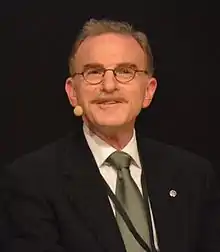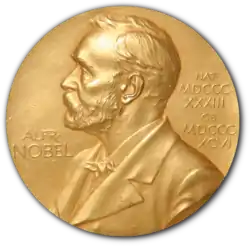Randy Schekman
Randy Wayne Schekman (born December 30, 1948) is an American cell biologist at the University of California, Berkeley[6] and former editor-in-chief of Proceedings of the National Academy of Sciences and Annual Review of Cell and Developmental Biology.[1][7][8][9] In 2011, he was announced as the editor of eLife, a new high-profile open-access journal published by the Howard Hughes Medical Institute, the Max Planck Society and the Wellcome Trust launching in 2012.[10] He was elected to the National Academy of Sciences in 1992.[11] Schekman shared the 2013 Nobel Prize for Physiology or Medicine with James Rothman and Thomas C. Südhof for their ground-breaking work on cell membrane vesicle trafficking.[12][13]
Randy Schekman | |
|---|---|
 Schekman in 2015. | |
| Born | Randy Wayne Schekman December 30, 1948 |
| Nationality | American |
| Alma mater | UCLA (BA) Stanford University (PhD) |
| Known for | Editor-in-chief of PNAS[1] and eLife[2] |
| Awards |
|
| Scientific career | |
| Institutions | University of California, Berkeley UCLA Howard Hughes Medical Institute Stanford University |
| Thesis | Resolution and Reconstruction of a multienzyme DNA replication reaction (1975) |
| Doctoral advisor | Arthur Kornberg |
| Doctoral students | David Julius[5] David Baker |
| Website | mcb royalsociety |
Early life and education
Schekman was born in Saint Paul, Minnesota, to Alfred Schekman, an electrical engineer and inventor and Esther (Bader) Schekman,[14] In the late 1950s his family moved to the new suburban community of Rossmoor, located in Orange County next to Long Beach. He graduated from Western High School in Anaheim, California, in 1966.[15] He received a BA in Molecular Sciences from the University of California in Los Angeles (UCLA), in 1971. He spent his third year at the University of Edinburgh in Scotland, as an exchange student.[1][16] He received a PhD in 1975 from Stanford University for research on DNA replication working with Arthur Kornberg.[17] After joining the faculty at University of California, Berkeley, he was promoted to Associate Professor in 1984 and Professor in 1994.
Research and career
Since 1991, Schekman has been a Howard Hughes Medical Institute Investigator,[18] Division of Biochemistry and Molecular Biology, Department of Molecular and Cell Biology, at the University of California, Berkeley. The Schekman Lab at that university carries out research into molecular descriptions of the process of membrane assembly and vesicular traffic[19] in eukaryotic cells[20][21] including yeast.[22] Before that, he was a faculty member with the now disbanded Department of Biochemistry at the same university.
Awards and honors
In 1992, Schekman was elected a Member of the National Academy of Sciences.[23] In 2002, Schekman received the Albert Lasker Award for Basic Medical Research[24] and Louisa Gross Horwitz Prize of Columbia University along with James Rothman for their discovery of cellular membrane trafficking, a process that cells use to organize their activities and communicate with their environment.[25] In 2008 he was named the first Miller Senior Fellow of the Miller Institute at the University of California Berkeley. He was awarded the Massry Prize from the Keck School of Medicine, University of Southern California, in 2010. Schekman is also a member of the Selection Committee for Life Science and Medicine which chooses winners of the Shaw Prize.
Schekman was elected a Foreign Member of the Royal Society (ForMemRS) in 2013. His nomination reads:
Using a brilliantly conceived genetic screen, Schekman isolated sec mutants that accumulate secretory pathway intermediates, he cloned the corresponding genes and he established biochemical reactions that faithfully reproduced specific secretory pathway events. These studies transformed the secretion field, previously descriptive and morphological, into a molecular and mechanistic one. The cell-free reactions that Schekman established led to his isolation of the Sec61 translocation complex, the (COPII) vesicle coat complex, and the first purified inter-organelle transport vesicles. The Sec proteins are strikingly conserved and the trafficking mechanisms that Schekman discovered are at the heart of neurotransmission, hormone secretion, cholesterol homeostasis and metabolic regulation.[3]
Schekman, Thomas C. Südhof, and James Rothman were awarded the 2013 Nobel Prize for Physiology or Medicine "for their discoveries of machinery regulating vesicle traffic, a major transport system in our cells".[12] Schekman "has already said he will donate his share of the prize money, $400,000, to create an endowment for the Esther and Wendy Schekman Chair in Basic Cancer Biology at UC Berkeley. Schekman's mother and sister, for whom the post is named, both died of cancer." [26]
In July 2014, he was awarded with the Shechtman International Leadership Award at SIPS 2014/Shechtman International Symposium in Cancun, Mexico, for his remarkable contributions to scientific innovation in academia.[27] In 2017, Schekman received the Golden Plate Award of the American Academy of Achievement.[28]
Open-access science
In December 2013, Schekman called for academic journal publishing reform and open access science publication by announcing that his lab at the University of California, Berkeley would no longer submit to the prestigious closed-access journals Nature, Cell, and Science, citing their self-serving and deleterious effects on science.[29] He has criticized these journals for artificially restricting the number of publications accepted to drive up demand.[29] In addition, Schekman says the journals accept papers that will be cited often, increasing the prestige of the journal, rather than those which demonstrate important results.[29] Schekman has said the prestige and difficulty of publishing in these journals sometimes cause scientists to cut corners or pursue trends, rather than conduct research on important questions. Schekman is the former editor of eLife, an open access journal and competitor to Nature, Cell, and Science.[29] Papers are accepted into eLife based on review by working scientists, similar to Nature, Cell, and Science.[29] Access to accepted papers is free.[29]
References
- Zagorski, N. (2008). "Profile of Randy Schekman: Reflections on his first year as PNAS Editor-in-Chief". Proceedings of the National Academy of Sciences. 105 (8): 2763–2765. Bibcode:2008PNAS..105.2763Z. doi:10.1073/pnas.0610781105. PMC 2268533. PMID 18287009.
- Schekman, R.; Patterson, M. (2013). "Reforming research assessment". eLife. 2: e00855. doi:10.7554/eLife.00855. PMC 3656620. PMID 23700504.
- "Professor Randy Schekman ForMemRS". Royalsociety.org. Retrieved October 7, 2013.
- Wickner, W. T. (2013). "Profile of Thomas Sudhof, James Rothman, and Randy Schekman, 2013 Nobel Laureates in Physiology or Medicine". Proceedings of the National Academy of Sciences. 110 (46): 18349–50. Bibcode:2013PNAS..11018349W. doi:10.1073/pnas.1319309110. PMC 3832004. PMID 24158482.
- "Julius Lab - David Julius". Physio.ucsf.edu. Retrieved October 7, 2013.
- "Randy Schekman: Howard Hughes Investigator and Professor of Cell and Developmental Biology". Retrieved July 12, 2011.
- Bucci, M. (2006). "Randy Schekman". Nature Chemical Biology. 2 (11): 568. doi:10.1038/nchembio1106-568. PMID 17051227. S2CID 40321085.
- Zagorski, N. (2006). "QnAs with Randy Schekman". Proceedings of the National Academy of Sciences. 103 (50): 18881. Bibcode:2006PNAS..10318881Z. doi:10.1073/pnas.0609700103. PMC 1748144. PMID 17148596.
- Schekman, Randy (1999). "Preface by Randy Schekman". Annual Review of Cell and Developmental Biology. 15. doi:10.1146/annurev.cb.15.010199.100001.
- "New journal editor named as Randy Schekman | Wellcome Trust". Retrieved July 12, 2011.
- List of publications from Microsoft Academic
- "The Nobel Prize in Physiology or Medicine 2013". Nobel Foundation. Retrieved October 7, 2013.
- Randy Schekman's publications indexed by the Scopus bibliographic database. (subscription required)
- St. Paul native lands 2013 Nobel Prize in Medicine
- Marroquin, Art (October 19, 2013). "Nobel Prize winner credits high school teacher". Orange County Register. p. Local 7.
- "Randy Schekman, molecular biologist and UCLA alumnus, wins 2013 Nobel Prize". University of California, Los Angeles. Retrieved October 8, 2013.
- Schekman, Randy Wayne (1975). Resolution and Reconstruction of a multienzyme DNA replication reaction (1975) (PhD thesis). Stanford University. ProQuest 302775556.
- "HHMI Scientist Abstract: Randy W. Schekman, Ph.D." Retrieved July 12, 2011.
- Schekman, R.; Orci, L. (1996). "Coat Proteins and Vesicle Budding". Science. 271 (5255): 1526–1533. Bibcode:1996Sci...271.1526S. doi:10.1126/science.271.5255.1526. PMID 8599108. S2CID 30752342.
- "Randy Schekman publications in Google Scholar". Retrieved July 12, 2011.
- Deshaies, R. J.; Koch, B. D.; Werner-Washburne, M.; Craig, E. A.; Schekman, R. (1988). "A subfamily of stress proteins facilitates translocation of secretory and mitochondrial precursor polypeptides". Nature. 332 (6167): 800–805. Bibcode:1988Natur.332..800D. doi:10.1038/332800a0. PMID 3282178. S2CID 39993735.
- Novick, P.; Field, C.; Schekman, R. (1980). "Identification of 23 complementation groups required for post-translational events in the yeast secretory pathway". Cell. 21 (1): 205–215. doi:10.1016/0092-8674(80)90128-2. PMID 6996832.
- http://www.nasonline.org/member-directory/members/62042.html
- Malhotra, V.; Emr, S. D. (2002). "Rothman and Schekman SNAREd by Lasker for trafficking". Cell. 111 (1): 1–3. doi:10.1016/S0092-8674(02)01008-5. PMID 12372293. S2CID 16018931.
- "Louisa Gross Horwitz Prize Awardees". Retrieved October 13, 2013.
- "US biologist Randy Schekman on being a Nobel Prize winner". Financial Times. Retrieved January 10, 2014.
- "Prof. Randy Shekman is awarded with Shechtman International Leadership Award in Cancun, Mexico". www.flogen.org. FLOGEN Star OUTREACH. Retrieved February 19, 2018.
- "Golden Plate Awardees of the American Academy of Achievement". www.achievement.org. American Academy of Achievement.
- Sample, Ian (December 9, 2013). "Nobel winner declares boycott of top science journals". theguardian.com. Retrieved December 16, 2013.
External links
- Randy Schekman on Nobelprize.org

| Wikimedia Commons has media related to Randy Schekman. |
| Academic offices | ||
|---|---|---|
| Preceded by Elizabeth Blackburn |
ASCB Presidents 1999 |
Succeeded by Richard Hynes |
| Preceded by Nicholas R. Cozzarelli |
PNAS editor-in-chief 2006–2011 |
Succeeded by Inder Verma |
| Preceded by — |
eLife editor-in-chief 2012–present |
Succeeded by — |
